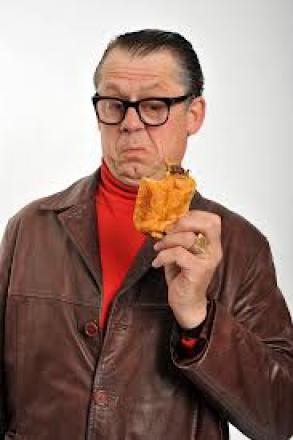
I think the first modern example of character comedy I ever saw was Edna Everage, followed shortly by John Shuttleworth about two decades ago. After him there seemed to be a flurry of weird eccentrics on the circuit from the Pub Landlord to Otis Lee Crenshaw via Count Arthur Strong.
Some came and went, some are still going. Chris Green invented music hall/hip hop artist Ida Barr and cowgirl Tina C. Matt Lucas had ageing madcap raconteur Sir Bernard Chumley. But it struck me recently that comedians don't really have to stick on a wig or a dress to become characters. A lot of stand-ups who are just onstage telling jokes are actually characters too.
This thought coalesced last week when I saw Eddie Pepitone. Onstage the Brooklyn comedian ranted his way through an hour of exquisite comedy, often touching on being one of life's losers, who when not onstage spends most of the day alone in his London hotel masturbating.
Now, apart from the fact that this would be an achievement for a 54-year-old that justifies a call to the Guinness Book of Records it did not quite ring true. According to Wikipedia Pepitone is married. Even if his wife is not in London the picture of him as a sad loner feels slightly less real knowing that he is in a relationship. Then the night after the gig I saw Pepitone guesting on BBC1 political chatfest This Week, which a) proved that he did not spend all of his time in his hotel room and b) revealed him to be an erudite, thoughtful conversationalist with reasonable opinions about the real world.
Which is not to say that you shouldn't catch Pepitone while he is over. He is without a shred of doubt very funny. It was simply a reminder that stand-up comedians often do best when they latch onto an element of their personality and exaggerate it for comic effect. Jack Dee does the same thing. I'm sure there is more than a grain of truth is his onstage morose disposition but he has mastered the art of mining that misery for full comic effect. But there is also some pretence involved that the audience knowingly and happily buys into. That's why comedians are called an "act" and their show is called as "performance".
The cliche runs that the best stand-up comedy has to be rooted in truth, so, as with Dee, there must be elements of Pepitone's genuine personality in his stand-up comedy that he is tapping into. That is why it works. Obviously he is not a complete failure – he has had a film made about him – Bitter Buddha – and is loved by the likes of Sarah Silverman and Patton Oswalt. But if there was not some authenticity there the show would not work.
What Pepitone and Dee are not doing, however, is simply making stuff up out of nowhere. They are fictionalising their life, not creating a fiction. They are a million miles removed from the old wave comedians who would tell gags about their mother-in-law being fat which may have been so unrelated to their actual circumstances they might as well not have been married.
There are comedians who are painfully honest, though. Daniel Kitson, of course, or David Baddiel, who has previously confessed to an almost pathological urge to spill the beans about his life onstage. Bridget Christie makes a point of explaining onstage that she is not doing character comedy: "I'm not playing an eighties feminist stand-up, this is me." But someone like Stewart Lee seems to straddle both camps, employing real facts and presenting a "version" of Stewart Lee. Likewise there is Richard Herring who is happily married and runs a thriving podcasting empire and "Richard Herring" who has a penchant for puerile jokes. Well, actually there might not be such a distinction there.
This is an odd dissonance about live comedy. We come for truth but are happy to get a version of it. Even if we secretly know this it does not necessarily ruin our night out. Comedy does not have to be about cartoonish exaggeration to be entertaining or provocative, but just because a comedian is not using a fake name or wearing a costume they have just put on in the dressing room it does not mean they haven't mastered the art of character comedy.





